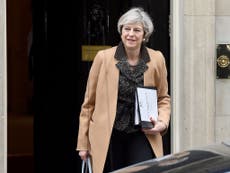Theresa May calling the EU's bluff could have disastrous consequences
The choice in 2019 cannot only be between the Government's deal or no deal with the EU, leading to the hardest possible Brexit – both may prove to be against Britain’s interests

For those who feared the very worst, the Prime Minister offered some scant grounds for Brexit optimism. Her tone, compared with that of the speech she gave at Lancaster House in January, was mostly conciliatory. The warmth of the words, and the invocation of a spirit of cooperation and “special relationship” will help, though they may not long survive the first skirmishes in the negotiating chambers of Brussels.
The priorities, for example, Theresa May set out in her letter to the European Council President Donald Tusk are broadly right, given the baleful circumstances. The rights of EU citizens in Britain, and of EU citizens resident in Spain and elsewhere, are given due recognition – “we should always put or citizens first”. As with the Brexit White Paper before, there is also an evident awareness of the imperative of preserving the traditional common travel area between Britain and Ireland, not least because of the Northern Irish peace process, in enough trouble already.
Scotland and other devolved administrations will gain new powers – an important concession to Nicola Sturgeon. Ms May was also surprisingly keen on “a bold and ambitious free trade agreement with the European Union that allows for the freest possible trade in goods and services between Britain and the EU’s member states”. Of course, for a services-oriented economy such as the UK, such a deal about physical goods is less valuable than it first appears, but still there is at least some positive ambition attached to that commitment.
There are plenty of grounds for disquiet, however. The first is the seeming lack of agreement even on the ground rules for the negotiations.
Already, the EU’s negotiators have indicated they wish to settle the “divorce bill” before sketching out any future economic relationships. The British plainly want both to be considered together. Not only that, but Ms May would like to link the talks on economic and trade matters with security cooperation, a new and potentially dangerous dimension to the proceedings.
In her letter the threat was explicit: “If, however, we leave the European Union without an agreement, the default position is that we would have to trade on World Trade Organisation terms. In security terms a failure to reach agreement would mean our cooperation in the fight against crime and terrorism would be weakened”. So there it is, then. As the inquest into the victims of the terror attack last week open, the British Government is prepared to countenance a weakening in the fight against terror in the pursuit of hard Brexit. It is no use ministers pleading that the Europeans would also suffer. It would not be the first set of negotiations where all parties contrived to make themselves worse off.
What is also apparent is that, in these negotiations, the advantage lies with the European side. They have vastly more negotiating experience; the remaining EU economy is much larger than Britain’s; the British need Europe more than Europe needs the UK; and, it must be remembered, Michel Barnier and his team have the luxury of just sitting back and using the time flowing away to their own advantage.
The most damaging aspect of Ms May’s declaration that “no deal is better than a bad deal” is that the Europeans may call her bluff – with disastrous consequences. Given the proximity of elections in France and Germany, few meaningful talks will take place before the end of this year.
Ms May also told Parliament that “this is an historic moment from which there can be no turning back”, but if the deal is poor then there should be a way back. Whatever the legal arguments, the political reality is that if the UK prefers membership on the existing terms, and its European partners are content for it to remain a member, then Article 50 may be put aside.
The choice in 2019 cannot only be between the Government's deal or the hardest possible Brexit, if both are against Britain’s interests. The British people should be allowed to decide in 2019 whether they like the look of life outside the EU or not, once they know what it looks like. They should be in full possession of the terms, facts and arguments so that they can make an informed judgement.
If today confirmed anything, it is that that was not the case in 2015 and it will not be the case until the terms of exit are agreed.


Join our commenting forum
Join thought-provoking conversations, follow other Independent readers and see their replies